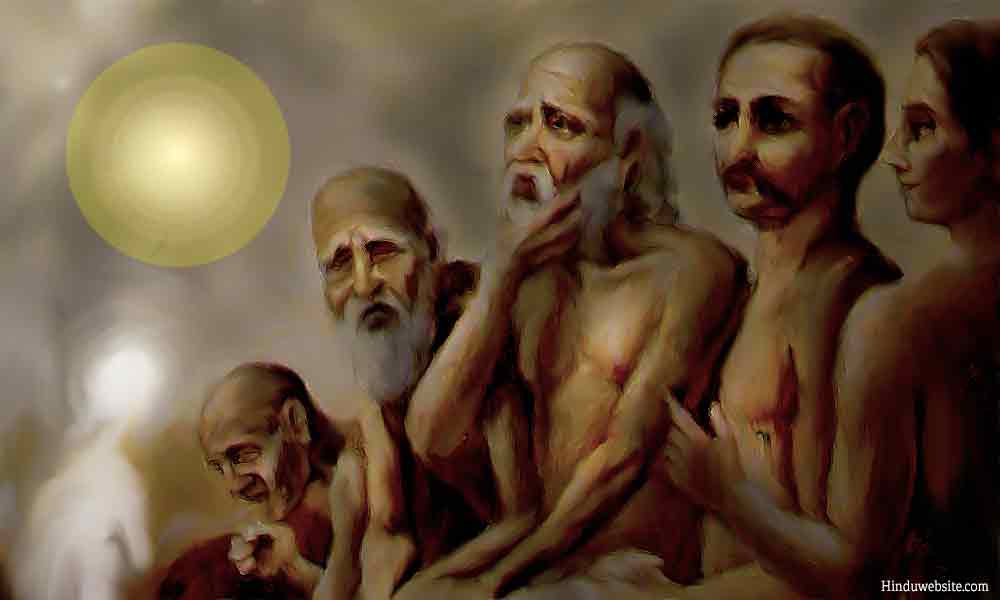
Samsara or the Transmigration of Souls

The concept of Samsara is common to Hinduism and all the other religions of Indian origin. Samsara means course, passage, circuit of life, worldly or secular life, mundane existence, or the material world. In a philosophical sense, samsara means the cycle of births and deaths, transmigration, or the wandering of the souls from birth to birth in the mortal world. The way of the world is known as samsara-marg, whereas liberation from it is known as samsara-moksha or vimochana.
According to these traditions, the embodied souls (jivas) in the mortal world are subject to the impurities of ignorance, duality, desires, egoism, and delusion, whereby they indulge in desire-ridden actions and incur karma which keeps them bound to the cycle of births and deaths. They remain so until they overcome their delusion and ignorance through spiritual practice and righteous living and achieve liberation.
Each religion prescribes various ways, by which one can cleanse the impurities and escape from samsara. Hinduism and Jainism hold that souls become subject to Samsara at the beginning of creation. Of them some souls achieve liberation while some remain bound forever. The liberated souls live in the highest realm and will never enter the samsara. Buddhism does not believe in creation. Hence, it does not clarify when the souls become bound. However, it suggests that souls can overcome their bondage to Samsara through the practice of Dhamma on the Eightfold Path and attain Nirvana.
The idea of rebirth and karma are mentioned in several Upanishads. Many scholars hold that these ideas did not originate in Vedic tradition, but were adapted by it from the renunciant traditions which were popular and numerous in ancient India. However, there is no evidence to substantiate it. Since the Upanishads that we have are loose compilations of ancient texts and fragmentary in nature, and since each of the major Upanishads contain verses which were most likely composed in different time periods, we cannot be certain on mere literary evidence that the early Vedic people had no knowledge of rebirth, karma, or liberation.
The Vedic sacrifices themselves are meant to earn merit and secure a good place in the ancestral heaven. There are numerous verses in the Vedas and the Upanishads which suggest how the souls may continue their existence in the ancestral heaven and strive to secure a good life in the next birth by taking birth in the same families where they were born before. The scriptures also specify gender specific roles, remedies, and duties to facilitate the birth of ancestors as progeny and continue their journey further.
Hinduism prescribes many solutions to deal with the problem of samsara. The following are a few important ones.
- Right knowledge.
- Celibacy.
- Restraint of the senses.
- Practice of virtue through rules and restraints.
- Desireless actions.
- Offering the fruit of actions to the Self or to God.
- Yoga.
- Detachment.
- Renunciation.
- Devotion
Suggestions for Further Reading
- The Concept of Atman or Eternal Soul in Hinduism
- The Problem of Maya Or Illusion and How To Deal With It
- Belief In Atman, The Eternal Soul Or The Inner Self
- Brahman, The Highest God Of Hinduism
- The Bhagavad Gita Original Translations
- The Bhagavadgita, Philosophy and Concepts
- Bhakti yoga or the Yoga of Devotion
- Hinduism And The Evolution of Life And Consciousness
- Why to Study the Bhagavadgita Parts 1 to 4
- Origin, Definition and Introduction to Hinduism
- Symbolic Significance of Numbers in Hinduism
- The Belief of Reincarnation of Soul in Hinduism
- The True Meaning Of Renunciation According To Hinduism
- The Symbolic Significance of Puja Or Worship In Hinduism
- Introduction to the Upanishads of Hinduism
- Origin, Principles, Practice and Types of Yoga
- Essays On Dharma
- Esoteric Mystic Hinduism
- Introduction to Hinduism
- Hindu Way of Life
- Essays On Karma
- Hindu Rites and Rituals
- The Origin of The Sanskrit Language
- Symbolism in Hinduism
- Essays on The Upanishads
- Concepts of Hinduism
- Essays on Atman
- Hindu Festivals
- Spiritual Practice
- Right Living
- Yoga of Sorrow
- Happiness
- Mental Health
- Concepts of Buddhism
- General Essays